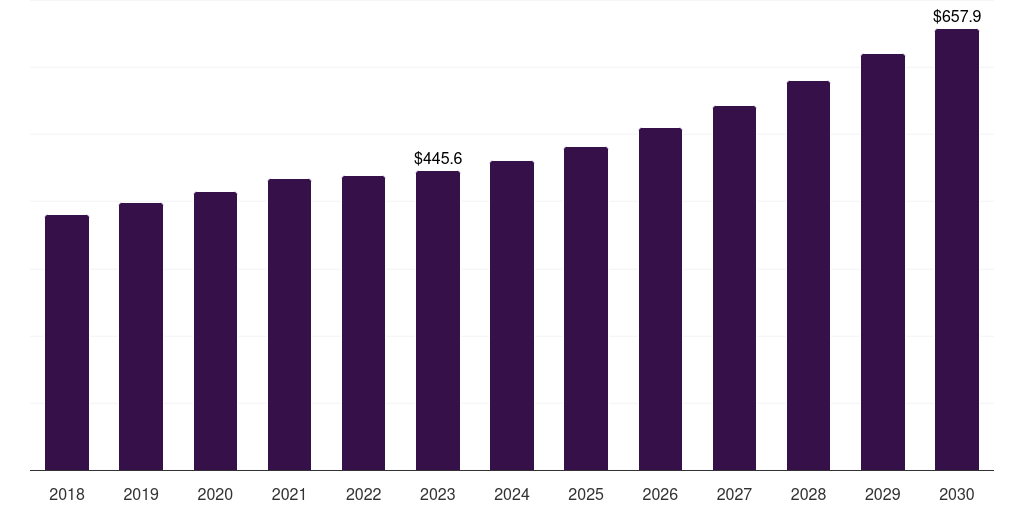Brazil Rheumatoid Arthritis Therapeutics Market Size & Outlook
Brazil rheumatoid arthritis therapeutics market, 2018-2030 (US$M)

Related Markets
Brazil rheumatoid arthritis therapeutics market highlights
- The Brazil rheumatoid arthritis therapeutics market generated a revenue of USD 445.6 million in 2023 and is expected to reach USD 657.9 million by 2030.
- The Brazil market is expected to grow at a CAGR of 5.7% from 2024 to 2030.
- In terms of segment, biopharmaceuticals was the largest revenue generating molecule in 2023.
- Biopharmaceuticals is the most lucrative molecule segment registering the fastest growth during the forecast period.
Rheumatoid arthritis therapeutics market data book summary
| Market revenue in 2023 | USD 445.6 million |
| Market revenue in 2030 | USD 657.9 million |
| Growth rate | 5.7% (CAGR from 2023 to 2030) |
| Largest segment | Biopharmaceuticals |
| Fastest growing segment | Biopharmaceuticals |
| Historical data | 2018 - 2022 |
| Base year | 2023 |
| Forecast period | 2024 - 2030 |
| Quantitative units | Revenue in USD million |
| Market segmentation | Pharmaceuticals, Biopharmaceuticals |
| Key market players worldwide | Boehringer Ingelheim, Novartis AG ADR, Regeneron Pharmaceuticals Inc, Pfizer Inc, Bristol-Myers Squibb Co, Roche Holding AG, UCB SA, Johnson & Johnson, Amgen Inc, AbbVie Inc |
Other key industry trends
- In terms of revenue, Brazil accounted for 1.8% of the global rheumatoid arthritis therapeutics market in 2023.
- Country-wise, U.S. is expected to lead the global market in terms of revenue in 2030.
- In Latin America, Brazil rheumatoid arthritis therapeutics market is projected to lead the regional market in terms of revenue in 2030.
- Argentina is the fastest growing regional market in Latin America and is projected to reach USD 215.5 million by 2030.
No credit card required*
Horizon in a snapshot
- 30K+ Global Market Reports
- 120K+ Country Reports
- 1.2M+ Market Statistics
- 200K+ Company Profiles
- Industry insights and more
Rheumatoid Arthritis Therapeutics Market Scope
Rheumatoid Arthritis Therapeutics Market Companies
| Name | Profile | # Employees | HQ | Website |
|---|
Brazil rheumatoid arthritis therapeutics market outlook
The databook is designed to serve as a comprehensive guide to navigating this sector. The databook focuses on market statistics denoted in the form of revenue and y-o-y growth and CAGR across the globe and regions. A detailed competitive and opportunity analyses related to rheumatoid arthritis therapeutics market will help companies and investors design strategic landscapes.
Biopharmaceuticals was the largest segment with a revenue share of 88.69% in 2023. Horizon Databook has segmented the Brazil rheumatoid arthritis therapeutics market based on pharmaceuticals, biopharmaceuticals covering the revenue growth of each sub-segment from 2018 to 2030.
The Brazil rheumatoid arthritis therapeutics market is influenced by various factors, including treatment patterns, patient demographics, and healthcare system dynamics. A 2023 study published by NCBI analyzed treatment patterns of RA in Brazil using DATASUS national administrative claims data, shedding light on the market trends and determinants of treatment choices.
Treatment patterns showed a steady decline in the use of adalimumab and etanercept in the past decade, with the emergence and increasing utilization of other bDMARDs such as rituximab, tocilizumab, certolizumab, and golimumab. However, by the end of 2020, adalimumab and etanercept remained the most commonly prescribed drugs for RA.
Factors influencing treatment decisions included age, healthcare coverage (SUS-exclusive or SUS+private), distance to the clinic, and previous exposure to conventional synthetic DMARDs (csDMARDs). These factors played a role in initiating or switching to novel targeted synthetic DMARDs (tsDMARDs) like JAK inhibitors.
Reasons to subscribe to Brazil rheumatoid arthritis therapeutics market databook:
-
Access to comprehensive data: Horizon Databook provides over 1 million market statistics and 20,000+ reports, offering extensive coverage across various industries and regions.
-
Informed decision making: Subscribers gain insights into market trends, customer preferences, and competitor strategies, empowering informed business decisions.
-
Cost-Effective solution: It's recognized as the world's most cost-effective market research database, offering high ROI through its vast repository of data and reports.
-
Customizable reports: Tailored reports and analytics allow companies to drill down into specific markets, demographics, or product segments, adapting to unique business needs.
-
Strategic advantage: By staying updated with the latest market intelligence, companies can stay ahead of competitors, anticipate industry shifts, and capitalize on emerging opportunities.
Target buyers of Brazil rheumatoid arthritis therapeutics market databook
-
Our clientele includes a mix of rheumatoid arthritis therapeutics market companies, investment firms, advisory firms & academic institutions.
-
30% of our revenue is generated working with investment firms and helping them identify viable opportunity areas.
-
Approximately 65% of our revenue is generated working with competitive intelligence & market intelligence teams of market participants (manufacturers, service providers, etc.).
-
The rest of the revenue is generated working with academic and research not-for-profit institutes. We do our bit of pro-bono by working with these institutions at subsidized rates.
Horizon Databook provides a detailed overview of country-level data and insights on the Brazil rheumatoid arthritis therapeutics market, including forecasts for subscribers. This country databook contains high-level insights into Brazil rheumatoid arthritis therapeutics market from 2018 to 2030, including revenue numbers, major trends, and company profiles.
Partial client list
Brazil rheumatoid arthritis therapeutics market size, by molecule, 2018-2030 (US$M)
Brazil Rheumatoid Arthritis Therapeutics Market Share, 2023 & 2030 (US$M)
Related regional statistics
No records
No related regions found.
Sign up - it's easy, and free!
Sign up and get instant basic access to databook, upgrade
when ready, or enjoy our
free plan indefinitely.
Included in Horizon account
- 30K+ Global Market Reports
- 120K+ Country Reports
- 1.2M+ Market Statistics
- 200K+ Company Profiles
- Industry insights and more



